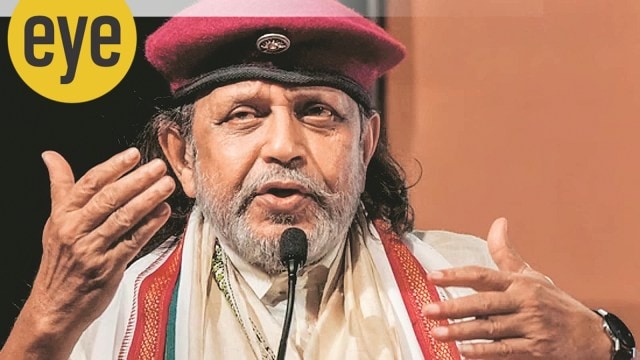Why author Sandip Roy thinks Disco Dancer Mithun Chakraborty, who has been honoured with the Dadasaheb Phalke Award, has got the moves
Common people saw him as their own and politicians wanted him on their side but all his life he battled a certain snobbery. Now with the Dadasaheb Phalke Award, Mithun Chakraborty is finally in a class of his own
 Mithun Chakraborty opened on receiving Padma Bhushan too late in his career. (Credit: PTI)
Mithun Chakraborty opened on receiving Padma Bhushan too late in his career. (Credit: PTI) THE BEST story about the star power of Mithun Chakraborty does not really feature Mithun Chakraborty at all. In his book Disco Dancer (Harper Collins India; 2011) about one of Mithun’s biggest hits, writer Anuvab Pal included some reviews that called Mithun’s performance as a star-spangled disco dancer with guitar trauma among the “worst ever” seen in commercial cinema. Some angry readers dubbed Pal an elitist snob jealous of the epic success of a film that became a super-hit even in Russia. Apparently when Rajiv Gandhi introduced Amitabh Bachchan to Mikhail Gorbachev as the “biggest superstar in India”, the Soviet leader replied, “But my daughter only knows Mithun.” Other readers wondered why Pal had even wasted his time analysing a pelvic thrust of a film like Disco Dancer.
Then Pal got an aggrieved email from a mimoh.chakraborty@yahoo.com asking how he could question the acting abilities of a National Award winner. It reminded him that Mithun was a “classic rags-to-riches story” and a superstar because “common people could see him as their own.”
Aware that Mithun’s son was named Mimoh, Pal shot off a chastened response saying he was, and continued to be, a fan of his father. Apparently mollified, Mimoh invited him to a small get-together at a fancy hotel and said his father would also be there.
A nervous Pal went and found there were no reservations, no Mimoh, and certainly no Mithun. After some expensive kebabs, he realised he had never checked if the email really belonged to Mimoh. Three months later an email arrived. “I hope you spent a lot of money and were embarrassed. It serves you right for making fun of a legend.” It was signed, “A fan.”
 When Disco Dancer came out in 1982, no one would have predicted its star Mithun Chakraborty would one day win the Dadasaheb Phalke Award for contributions to Indian cinema
When Disco Dancer came out in 1982, no one would have predicted its star Mithun Chakraborty would one day win the Dadasaheb Phalke Award for contributions to Indian cinema
When Disco Dancer came out in 1982, no one would have predicted its star Mithun Chakraborty would one day win the Dadasaheb Phalke Award for contributions to Indian cinema. Reacting to the award, even Mithun said, “I never imagined that a boy from the footpath could receive such a big honour.” And that he would win it not in spite of a Disco Dancer but in large part because of films like Disco Dancer. He might have won a National Award for his debut film, Mrinal Sen’s Mrigayaa in 1976, but it was films like Disco Dancer, Swami Dada (1982) and Kalankini Kankabati (1981) that kept bringing the masses into theatres. The aggrieved fan was right. Mithun Chakraborty was a star because “common people could see him as their own.” And that is never something to scoff at.
That is why political parties want the Mithun touch. In socialist India, he was part of the CPI (M). His bios routinely refer to him as an ex-Naxalite. He even acted in a KA Abbas film called The Naxalites (1980) with Smita Patil. Then he became close to West Bengal’s Left Front minister Subhas Chakraborty and got Bollywood stars to come to Kolkata for a glitzy flood relief ‘Hope-86’ show, much to the chagrin of other Communist leaders who shuddered at such apasanskriti, literally “un-culture”. Years later, he went to the Rajya Sabha on a Trinamool ticket and was interrogated by the Enforcement Director probing the Saradha chit-fund scam. Now he has lent his magic to the BJP.
When Modi held a rally in Kolkata in 2021, Mithun da, a bona fide “son of Bengal”, showed up and regurgitated some filmi lines for electoral effect. Like “ I’ll give you one slap here, your corpse will land in the crematorium over there”. Or “I am no harmless water snake. I am pure cobra. Ek chhoboleyi chhobi (One bite and you will become a photograph).” Trust me, it sounds punchier in Bengali.
In another star, such party-hopping would be seen as rank opportunism. But somehow Mithun comes across as so genuine and affable, no one really minds. For his fans, he is MLA Fatakeshto, a small-time goon who becomes a politician, party affiliation irrelevant. Only the street-smart dialogues matter. He has built himself as the star who has never forgotten his humble roots. For two decades, he served as chair of the Film Studios Setting and Allied Mazdoor Union. Stories of his quiet generosity towards those fallen on hard times abound. Now when he appears as a Mahaguru in a beanie and cape on a dance reality show, everyone on set, of all political stripes, goes berserk.
Coming into the industry when the Angry Young (ish) Man was king, Mithun always struggled against the label of being a poor man’s Amitabh Bachchan. But, in this case, the label was literally true. “Main gareebon ke liye hero hoon (I am a hero for the poor),” he said, in Goonda (1998). The poorer man, the autowalla, the factory worker, the kirana shop guy, constituted his fan base. And he delivered to them loyally. And within budget. He once said, “Other stars give the starting date of a film. I give a completion date.” In these budget-conscious times, perhaps it’s only fitting that Dadasaheb Phalke will recognise the worth of its most budget-friendly inflation-proof megastar. That’s not to say the FTII graduate might not have had other dreams. He said in an interview, “I act in potboilers” because offers for art films like Mrigayaa “are few these days.” When they have come along, he has shown his mettle — another National Award as a worn-out freedom fighter in Tahader Katha (1992) and a best supporting actor playing Sri Ramakrishna in Vivekananda (1998). In that sense, Mithun and Bappi Lahiri, the man who gave us the disco in Disco Dancer, were both capable of very different work but recognised what the market craved. Lahiri once said. “I am like a shopkeeper who has to sell what people want from his shop.” Both did it uncomplainingly.
But Mithun also spearheaded another cultural change. Now the buff dancing hero is a given whether it’s Tiger Shroff or Hrithik Roshan. When Mithun came into the scene that was not the case. Rajesh Khanna seduced with a cocked head and limpid eyes. Dharmendra was more manly than chiselled. Amitabh was known more for his height and baritone than his body.
In Bondhu (Seagull Books; 2023), his memoir about his father Mrinal Sen, Kunal Sen writes that Mithun always “wore tight bell-bottomed trousers and a skin-fitting shirt left open halfway down his torso to expose his extremely well-built physique.” That physique came in handy while playing the bare-chested tribal hunter in Mrigayaa (1976), though Sen says Mithun looked as “though he would die of grief” when his styled hair was given a “brutal” cut for the role. Once Mithun accompanied Sen to the local pharmacy. The store clerk took one look at him and asked in a low voice who he was. “Mithun was very much out of place in our typical middle-class milieu,” writes Sen. It’s a telling anecdote.
It is that bhadralok snobbery that Mithun has battled all his life. He has always been a little out of place whether in Kolkata or Mumbai, successful yet regarded by the gentry as a bit déclassé.
Now with the Dadasaheb Phalke Award, he is finally in a class of his own. Jimmy Jimmy has become King Cobra. Or as his character might say, Ek chhoboleyi Phalke.
Roy is a novelist and author of Don’t Let Him Know



- 01
- 02
- 03
- 04
- 05




























